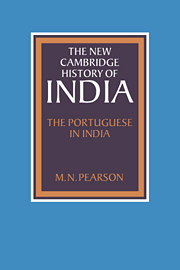4 - Indo-Portuguese society
Published online by Cambridge University Press: 28 March 2008
Summary
We can now leave this long discussion of the Portuguese ‘official’ presence and system, and look at areas of social interaction in India. We will present a case study of the Portuguese capital of Goa, and discuss religion separately. The best way to enter this area, however, is to look at Portuguese private trade, for in many ways this exemplified Portugal's unofficial activities in India. In a nutshell, we find interaction, not domination, with the Portuguese contributing something, as also did locals, towards the rich melange of coastal Asian trade.
It will be remembered that one feature of the official system was the attempt to dominate particular Asian routes. Sometimes these rights were used by agents of the king, but more often they made up part of the package by which the captain of a fort, or holder of some other official position, was paid. In either case, these rights were often sold by the holder. This part of the official system was particularly loose. Trade between the two ports concerned was usually not restricted only to the holder of the official voyage. The advantage of shipping with an official ship was in part greater security, and also some concessions on customs payments. Thus while they made up a very important part of Portuguese official trade – we have noted these Asian concessional voyages produced four times more profits than did the Cape route – in terms of total trade directed by the Portuguese, let alone total Asian trade, they were relatively minor. Indeed they should be seen as similar to the totally private trade.
- Type
- Chapter
- Information
- The Portuguese in India , pp. 81 - 115Publisher: Cambridge University PressPrint publication year: 1988

